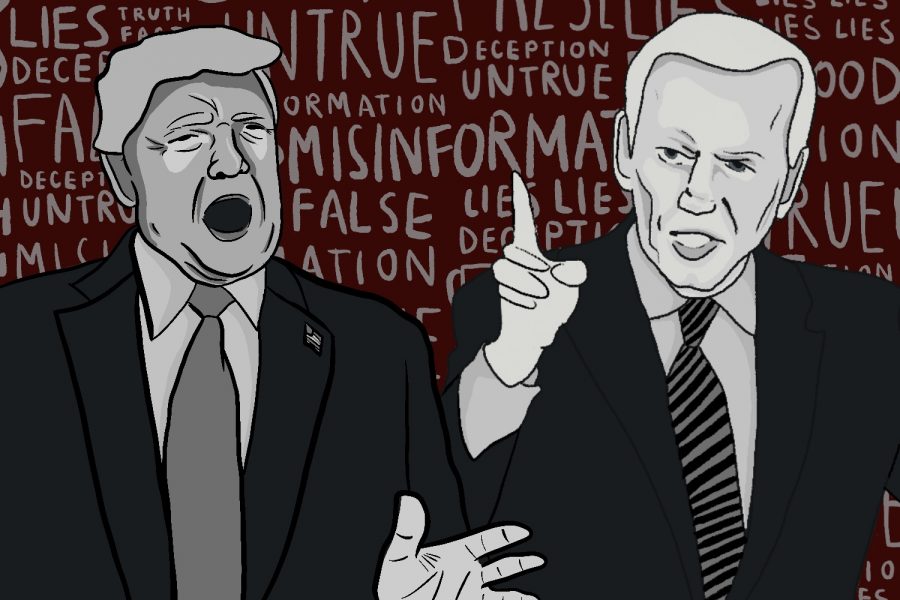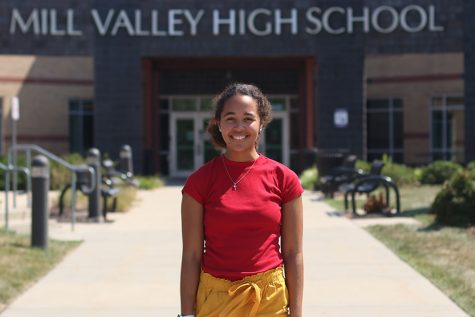Biden-Trump town halls show why presidential debates need to be canceled permanently
In federal elections, presidential debates are a vector for misinformation and fail to meaningly inform voters
JagWire reporter Gabby Delpleash argues that presidential debates have become a vector for misinformation and fail to meaningly inform voters.
October 19, 2020
On Oct. 11, the Commission on Presidential Debates officially canceled the second presidential debate of the 2020 general election, originally scheduled for Thursday, Oct. 15. The cancellation was caused by President Trump’s refusal to debate remotely, despite his positive COVID-19 test.
According to debate commission member and negotiator for one of the first televised debates Newton Minow, the cancellation’s real victim was American Democracy.
“In seven decades of televised presidential debates, this is the first one to be canceled,” Minnow said to the New York Times. “The loser is the American voter.”
However, Minow forgets that in 1964, 1968, and 1972, debates were not canceled because they were not held at all. While there is little doubt that the 1960 debates Minow helped negotiate for John F. Kennedy was a watershed moment for television as a medium for popular democracy, they happened 60 years ago. Telecommunications has changed dramatically and so has politics.
Plenty of observers called for canceling the remaining debates after the embarrassing first confrontation between Trump and Joe Biden; however the CPD should give up on presidential debates period. Debates can still provide useful information for Senate or governor’s candidates, or in primary elections. But there is no reason to think, in 2020, that televised debates between major-party presidential nominees provide any real value to voters.
According to the New York Times, many undecided voters have stated they “don’t have any more information than when they started watching.” Instead, they receive a great deal of falsehoods, in large part because President Trump has learned that the costs of spreading misinformation are minimal and benefits are immense.
In addition to spreading misinformation, debates don’t appear to change any minds; they are only a good use of time if they provide useful new information to voters that they either would not or could not obtain through other means. The simplest way to know if debates are providing useful information is to test if they change voters’ preferences.
Moreover, the vast majority of viewers are already decided; in a recent poll, only 6 percent of likely voters planning to watch the first debate claimed to be undecided. The bulk of political science literature has not found much evidence that debates substantially influence the outcomes of presidential elections.
Robert Erikson and Christopher Wlezien’s 2012 book “The Timeline of Presidential Elections” compiled evidence on the effect of general election presidential debates from 1960 to 2008, and they indeed found that in general, not many voters are up for grabs by the fall when debates take place; in 2004 and 2008, the most recent elections in their sample, opinions of voters had hardened even earlier, by the summer. That puts a relatively low upper bound on how influential debates could be.
In any case, Erikson and Wlezien find that except for the 1976 election, “vote intentions the week after the debates closely matched those the week before the debates.” In other words, it’s hard to detect much change in overall voter opinion attributable to the debates.
“It is clear that debates do not have a major impact to the same degree as party conventions,” Erikson and Wlezien conclude carefully. Their data appears consistent with studies that came before that showed small effects from presidential debates on voter choice. There’s not much reason to conclude, from the data they present, that presidential debates have a major impact at all.
Debates might offer some value in creating a single, focusing event that lets low-information voters get back up to speed. But for them to serve that purpose, the information would need to be accurate, and the 2020 debates to date are excellent illustrations of candidates’ abilities to lie without being interrupted by moderators.
The crux of the matter is that presidential debates fail to surface new information that voters cannot get elsewhere and don’t influence the ultimate vote totals. Thus, it ultimately becomes impractical to insist on continuing to hold them.










Jay Reeder • Oct 20, 2020 at 2:21 pm
I find this to be well written, with good facts to validate the opinion! Great job!